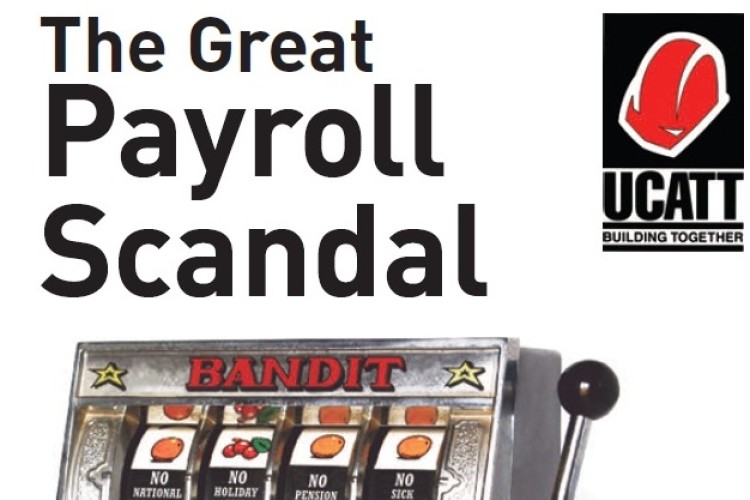Roughly £1.2bn of this is in the form of unpaid national insurance that employers are avoiding.
The report published by construction union Ucatt highlights how the use of payroll companies has increased in the construction industry and establishes how they are being used to codify what Ucatt calls ‘false self-employment’ in the industry.
Called The Great Payroll Scandal, it details how workers have to sign contracts with payroll companies to get work. By keeping their workers officially registered as self-employed, employment rights are limited and the worker must pay the payroll company’s charge for the service (usually between £10 and £25 per week). This fee is taken directly from their wages.
The largest payroll company, Hudson Contract, has more than 114,000 workers on its books.
Ucatt general secretary Steve Murphy said: “This report is highly significant as it details how workers have little or no option but to sign away their rights and be paid by a payroll company. Having been forced to accept this arrangement they then experience the double whammy of having to pay for the privilege.”
The report estimates that false self-employment throughout the construction industry is costing the Treasury £1.9bn a year, with the principal beneficiaries being employers who save £1.2bn a year by avoiding paying employers’ national insurance contributions of 13.8% per worker.

Self-employed workers can be sacked without warning, do not receive holiday or sick pay, do not have a company pension, have reduced benefit entitlements and are denied access to employment tribunals. "Say goodbye to HMRC status issues and employment tribunal challenges," says Hudson Contract's homepage.
The report claims that HM Revenue & Customs has ‘virtually given up’ on enforcing employment status in construction, with the number of reviews it was conducting more than halving from over 1,000 in 2009/10 to just 433 in 2011/12.
Mr Murphy added: “False self-employment is costing the Treasury billions every year. Given that fact it is simply unforgiveable that they are reducing their enforcement activity. This is making it far easier for unscrupulous employers to avoid paying their correct contributions and leads to workers losing their rights.”
Hudson Contract responded to the UCcatt report by saying that it also “condemns false self-employment”. It contracts director Ian Anfield said: "Just as in any other industry, construction workers have the right to sell their services on a self-employed basis – many prefer self-employment as it allows them the opportunity to maximise their earning potential, and to develop from one-man-bands into businesses in their own right. Operatives contracted by Hudson Contract are clear about the risks and the benefits of self-employment, and make an informed choice.”
He said that more than 600,000 builders choose to work as freelancers and Hudson Contract provided them with legitimate service that helps construction firms with the payroll and contract obligations of taking on freelance builders.
“To label all, or even the majority of, self-employed construction workers as false is wrong, many of them go on to become employers themselves and all deserve the opportunity.”
Got a story? Email news@theconstructionindex.co.uk



